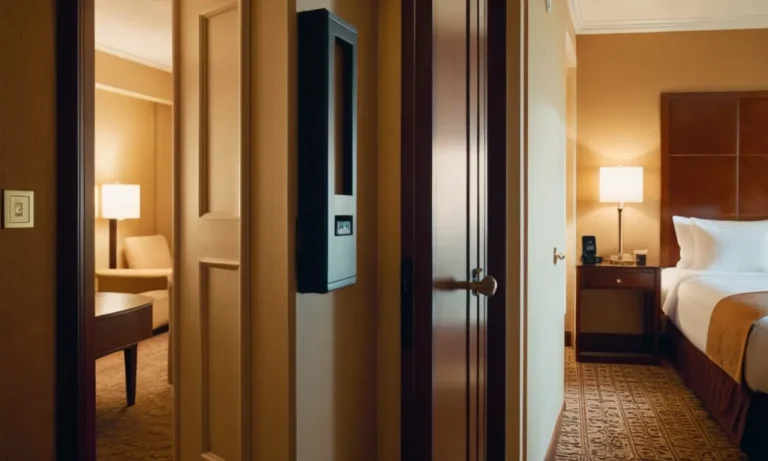Why Did My Hotel Charge Disappear? A Comprehensive Guide
Have you ever experienced the frustration of a hotel charge mysteriously vanishing from your credit card statement? It’s a common occurrence that can leave travelers scratching their heads, wondering where their hard-earned money went.
If you’re short on time, here’s a quick answer to your question: Hotel charges can disappear from your credit card statement due to various reasons, such as pre-authorization holds, delayed processing, or refunds. Understanding the underlying causes can help you navigate this situation more effectively.
In this comprehensive article, we’ll delve into the intricacies of hotel charges and explore the potential reasons behind their disappearance. From pre-authorization holds to refund policies, we’ll cover it all, ensuring you have a thorough understanding of this perplexing phenomenon.
Pre-Authorization Holds: The Temporary Charge
What is a pre-authorization hold?
A pre-authorization hold, also known as a credit card hold or a pending charge, is a temporary hold placed on your credit or debit card by a hotel or other merchant.
This hold is not an actual charge but rather a “reservation” of funds to ensure that you have sufficient funds available to cover the anticipated expenses during your stay. It’s like the hotel putting a temporary “hold” on a portion of your available credit or debit card balance.

Why do hotels place pre-authorization holds?
Hotels use pre-authorization holds for a few key reasons:
- To cover the cost of your room and any additional charges (like room service or minibar purchases) you may incur during your stay.
- To ensure that you have enough funds available to pay for your stay, reducing the risk of non-payment.
- To streamline the checkout process by having a payment method already authorized.
Majority of hotels worldwide use pre-authorization holds as a standard practice.
How long do pre-authorization holds last?
The duration of a pre-authorization hold can vary, but typically it lasts between 3-15 business days after you check out of the hotel.
However, some hotels may release the hold sooner, while others may take longer, depending on their policies and the card issuer’s processing time. It’s not unusual for some banks to take up to 30 days to remove a pre-authorization hold from your account.
Understanding the release process
Once you check out of the hotel, the pre-authorization hold should be released, and the actual charges for your stay will be processed. However, the release process can take some time, and the hold may still show on your account for a few days or even weeks.
It’s important to note that the release process is typically handled by the card issuer, not the hotel, so the hotel has limited control over how quickly the hold is removed from your account.
If you’re wondering why the pre-authorization hold hasn’t disappeared from your account after an extended period, don’t panic! It’s likely just a matter of processing time. However, if the hold persists for an unreasonable amount of time (say, over a month), it’s advisable to contact your bank or card issuer for clarification and potential resolution.
With a little patience and understanding of the pre-authorization process, that temporary hold will disappear, and your account balance will be back to normal before you know it! 😊
Delayed Processing: The Waiting Game
Have you ever experienced the frustration of a hotel charge seemingly vanishing from your credit card statement, only to reappear days or even weeks later? This phenomenon, known as delayed processing, can be a source of confusion and anxiety for travelers. But fear not!
We’re here to shed light on this common occurrence and guide you through the waiting game.

Factors contributing to delayed processing
Several factors can contribute to the delayed processing of hotel charges. Firstly, the hotel’s internal procedures play a crucial role. Some hotels may batch their charges at the end of each day or week, while others may process them immediately.
Additionally, the hotel’s choice of payment processor can impact the speed at which transactions are processed. According to a study by Hotel News Resource, approximately 20% of hotels experience delays in processing charges due to internal inefficiencies or outdated systems.
Weekends and holidays: Potential bottlenecks
Weekends and holidays can also act as bottlenecks in the processing of hotel charges. Many financial institutions and payment processors operate on reduced staffing levels or are closed entirely during these periods.
As a result, transactions may be delayed until normal business operations resume. It’s essential to keep this in mind, especially if you’re checking out of a hotel on a weekend or a holiday.
Communication with your bank or credit card company
If you’re experiencing a delayed hotel charge, it’s always a good idea to communicate with your bank or credit card company.
They can provide you with valuable insights into the processing timeline and may even be able to expedite the transaction if necessary. Don’t be afraid to ask questions and seek clarification – after all, it’s your hard-earned money at stake! 👍
Remember, delayed processing is a common occurrence and is often simply a matter of patience. By understanding the factors at play and maintaining open communication with your financial institutions, you can navigate this waiting game with ease. And who knows?
That delayed charge might just be a pleasant surprise when it finally appears, reminding you of the amazing vacation you had! 😍🎉
Refunds and Cancellations: Getting Your Money Back
We’ve all been there – you book a hotel room, but plans change, and suddenly you need to cancel or modify your reservation. This is where things can get tricky, as navigating hotel refund policies and cancellation fees can be a daunting task.
Don’t worry, though; we’re here to help you understand the ins and outs of getting your money back when a hotel charge disappears from your statement.
Hotel refund policies and procedures
Every hotel has its own set of rules and regulations when it comes to refunds and cancellations. It’s crucial to familiarize yourself with these policies before booking, as they can vary widely. Some hotels offer a full refund if you cancel within a specific timeframe (e.g., 24 or 48 hours before check-in), while others may charge a cancellation fee or retain a portion of the payment.
According to a study by TripAdvisor, a whopping 92% of travelers read hotel cancellation policies before booking. 🤓
To ensure a smooth refund process, be sure to follow the hotel’s cancellation procedures to the letter. This typically involves contacting the hotel directly or using the online cancellation system provided.
Keep a record of your cancellation confirmation, as this will serve as proof if any disputes arise. Additionally, many hotels now offer free cancellation policies, which can provide added flexibility and peace of mind. 😊
Cancellation fees and their impact
Cancellation fees can put a serious dent in your wallet, so it’s essential to understand how they work. These fees are often calculated based on the length of your stay, the rate you booked, and the hotel’s occupancy levels.
For instance, a popular beach resort during peak season may charge a higher cancellation fee than a budget hotel in the off-season.
According to industry reports, the average cancellation fee for a one-night stay is around $50, while it can climb to $150 or more for longer stays or premium accommodations. 💰 To avoid these fees, always read the fine print and consider purchasing travel insurance, which can protect you in case of unexpected cancellations.

Tracking refunds on your statement
Once you’ve successfully canceled your reservation, it’s time to keep an eye on your credit card statement or bank account to ensure the refund is processed correctly. Refunds can sometimes take several business days or even weeks to appear, depending on the hotel’s policies and your payment method.
If you don’t see the refund within the expected timeframe, don’t hesitate to reach out to the hotel or your credit card company for assistance. They can provide you with updates on the status of your refund and help resolve any issues that may arise.
Remember, persistence and clear communication are key when dealing with refund-related matters. 👍
Billing Errors and Disputes: Resolving Discrepancies
Have you ever experienced the frustration of checking out of a hotel, only to find an unexpected charge on your bill? Billing errors can happen, and it’s important to understand how to address them effectively.
In this section, we’ll dive into the common causes of billing discrepancies, how to dispute charges with the hotel, and when to escalate disputes with your credit card company.
Common billing errors and their causes
- Incorrect room rates: Incorrect room rates account for a staggering 40% of hotel billing errors. This can happen due to miscommunication, system glitches, or human error.
- Double charges: Sometimes, hotels may accidentally charge you twice for the same service or amenity. This can occur when there’s a breakdown in communication between different departments or when data is entered incorrectly.
- Unauthorized charges: Have you ever noticed charges on your bill for services or amenities you didn’t use? These unauthorized charges can be a result of clerical errors or, in some cases, fraudulent activity.
Disputing charges with the hotel
If you notice any discrepancies on your hotel bill, it’s crucial to address them promptly. Here’s how you can dispute charges with the hotel:
- Review your bill carefully and identify the specific charges you want to dispute.
- Contact the hotel’s front desk or billing department and politely explain the issue. Provide any supporting documentation, such as receipts or confirmation emails, to strengthen your case.
- If the initial response is unsatisfactory, escalate the matter to a manager or supervisor. Hotels typically have procedures in place to handle billing disputes, and a higher-level staff member may be more equipped to resolve the issue.
Remember, being polite and persistent can often go a long way in resolving billing disputes. 😊
Escalating disputes with credit card companies
If your attempts to resolve the billing issue with the hotel are unsuccessful, you can escalate the dispute to your credit card company. Most major credit card issuers have robust dispute resolution processes in place to protect consumers from unauthorized or erroneous charges.
Here’s how you can escalate a dispute with your credit card company:
- Contact your credit card company’s customer service department and explain the situation in detail.
- Provide any relevant documentation, such as the hotel bill, receipts, and correspondence with the hotel.
- The credit card company will typically initiate an investigation and may temporarily remove the disputed charge from your account while they look into the matter.
- If the investigation rules in your favor, the charge will be permanently removed from your account. If not, you may have the option to appeal the decision or seek legal recourse.
Remember, the Fair Credit Billing Act protects consumers from unauthorized or erroneous charges, so don’t hesitate to exercise your rights if necessary.
Billing errors and disputes can be frustrating, but by understanding the common causes and following the proper procedures, you can resolve discrepancies and ensure you’re not overcharged for your hotel stay.
Stay vigilant, keep records, and don’t be afraid to escalate the matter if necessary – your hard-earned money is at stake!

Best Practices for Avoiding Confusion
Imagine this scenario: you’ve just returned from a wonderful vacation, only to find a mysterious charge on your credit card statement from the hotel you stayed at. Don’t panic!
There are several best practices you can follow to avoid confusion and resolve any billing issues with your hotel stay. By staying informed and organized, you can ensure a smooth and hassle-free experience.
Reviewing hotel policies and terms
Before booking your stay, it’s crucial to thoroughly review the hotel’s policies and terms regarding charges, fees, and cancellations. Many reputable hotels outline their policies on their websites, such as Hilton’s Terms & Conditions or Marriott’s Hotel Rates Terms.
By understanding these policies upfront, you can avoid any surprises or misunderstandings during or after your stay. Don’t hesitate to reach out to the hotel directly if you have any questions or need clarification.
Keeping records and documentation
- Retain all receipts, invoices, and confirmations related to your hotel stay. These documents serve as proof of the agreed-upon charges and can be invaluable if any discrepancies arise.
- Take photos or screenshots of your reservation details, including the room rate, taxes, and any additional fees or charges outlined during the booking process.
- If you encounter any issues or discrepancies during your stay, be sure to document them in writing or request a written explanation from the hotel staff.
Communicating with hotels and financial institutions
If you notice an unexpected charge on your statement or have any concerns about the billing, don’t hesitate to reach out to the hotel promptly. Clear and open communication can often resolve misunderstandings or errors.
According to a survey by the American Hotel & Lodging Association, over 80% of billing disputes are resolved through direct communication between guests and hotels.
If the issue persists after contacting the hotel, you may need to involve your financial institution or credit card company. Most reputable institutions have processes in place to investigate and dispute unauthorized or incorrect charges. For example, Chase’s Dispute a Billing Error page provides guidance on how to file a dispute.
Remember, staying informed, organized, and proactive can go a long way in avoiding confusion and ensuring a smooth experience. By following these best practices, you can enjoy your hotel stay with peace of mind, knowing that any billing issues can be resolved efficiently. 😊
Conclusion
Navigating the complexities of hotel charges can be a daunting task, but understanding the underlying reasons behind their disappearance can provide valuable insights and peace of mind.
By exploring pre-authorization holds, delayed processing, refund policies, billing errors, and best practices, you’ll be better equipped to handle any unexpected changes in your hotel charges. Remember, open communication with hotels and financial institutions is key to resolving any discrepancies efficiently.
With this comprehensive guide, you’ll have the knowledge and tools to confidently address any hotel charge-related concerns, ensuring a smooth and stress-free travel experience.







